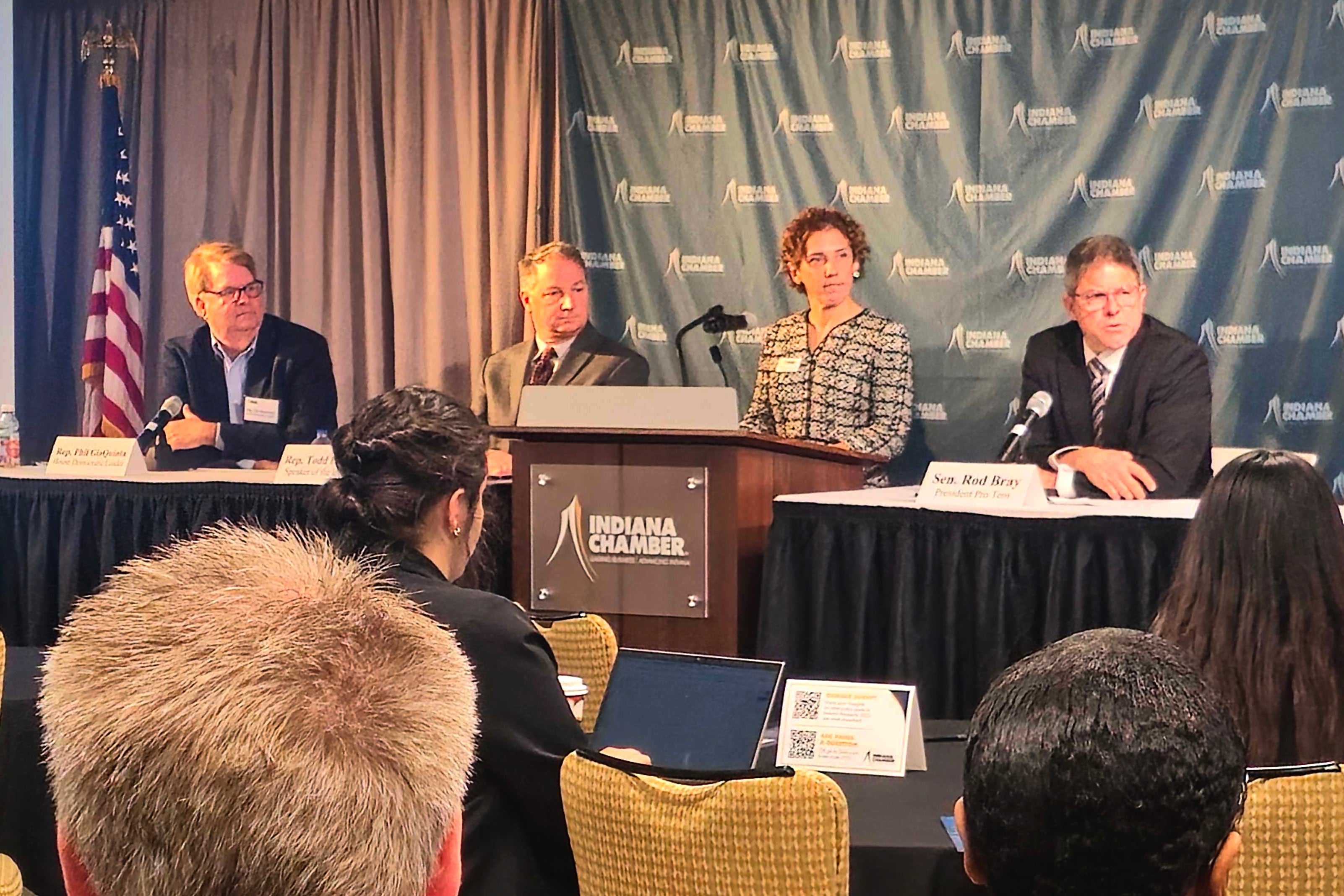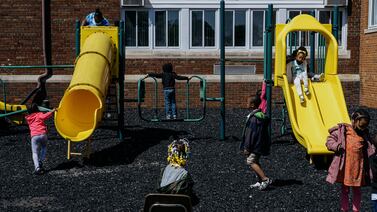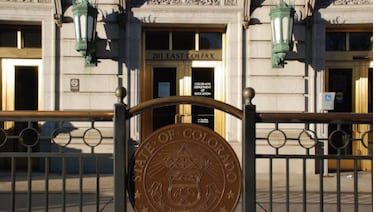Sign up for Chalkbeat Indiana’s free daily newsletter to keep up with Indianapolis Public Schools, Marion County’s township districts, and statewide education news.
Uncertainty about Indiana’s budget marked the unofficial start of the 2025 legislative session this week — and comes at a particularly bad time for schools.
Legislative leaders agreed at a Monday legislative preview event with the Indiana Chamber of Commerce that the state will likely have less revenue than in recent past years, given factors like the end of its pandemic relief funding and a Medicaid shortfall.
For schools already grappling with the end of the federal pandemic relief money, that could mean help isn’t coming from the state to save a host of ESSER-funded programs, from academic recovery efforts to background checks for volunteers.
Lawmakers’ decisions for the 2025-27 biennial budget will determine how much money is available for base K-12 funding and programs like tutoring and summer school, as well as whether teachers will see higher salary minimums and whether the state’s near-universal voucher program expands. Leaders did not signal either way whether base funding for K-12 schools would increase or decrease.
Speaking at the event, Senate President Pro Tem Rod Bray and House Speaker Todd Huston said lawmakers’ priority is passing a balanced budget with potentially less funding.
House Minority Leader Phil GiaQuinta agreed there may be more uncertainty during the next biennial budget, especially with the end of COVID relief money.
“When they say there’s no money, there may not actually be any money this year,” GiaQuinta said.
The December revenue forecast will inform much of the budget-making process in the spring, and Republican leaders will likely preview more of their priorities on Tuesday for Organization Day, the ceremonial start of the 2025 session, which will officially begin in January.
Property tax reform could impact school referendums
Further complicating the funding question for schools are lawmakers’ steps to limit property tax referendums, which Indiana school districts rely on to supplement state dollars for salaries and programs. The referendums also fund construction and safety improvement projects.
Governor-elect Mike Braun has made property tax reform a centerpiece of his agenda, including limiting property tax referendums to general election years, capping tax bill growth, and changing the referendum language to emphasize a total levy.
Referendums can currently be held in any primary or general election. Earlier this year, House Bill 1376 sought to restrict referendums to general election years, but it did not pass the Senate.
But Bray said larger property tax reforms will likely take more time than just one legislative session.
“I don’t know that you’ll see really big changes happen this year, maybe some tweaks to kind of help people feel less of a pinch than they have,” Bray said.
GiaQuinta cautioned against drastic changes that could affect governing bodies like school districts.
“Whenever we fool around with these things, we’re affecting local governments and their ability to do the things they have to do,” he said.
No universal preschool, more high school internships
Huston and Bray highlighted the state’s moves to bring career training to high school students, such as through a scholarship account program that provides students state funds to do internships and apprenticeships at outside companies.
New graduation requirements expected to be approved next month also place an emphasis on working while in high school.
But Huston also said the next steps require more investment from industry.
“We need more businesses to step up and provide opportunities to kids, internships, apprenticeships, those kinds of things,” Huston said. “We can’t rely on the workforce to show up at our door.”
GiaQuinta highlighted the need for more initiatives to help Indiana students attend college and stay in the state after graduation. A 2022 study from the Chamber of Commerce found that around 40% of college graduates leave Indiana within one year.
He also said education is the ultimate path forward to economic development.
“Businesses are going to go where there’s trained workers to the jobs that are available,” GiaQuinta said.
GiaQuinta reemphasized Democrats’ push for a universal preschool program.
The Chamber has historically advocated for more child care and early education programs as a means of economic development. The organization plans to release its advocacy priorities in January.
Huston said lawmakers began the process last year of reducing government regulations for child care providers that have prevented both centers and home providers from opening. This year, he said lawmakers may consider looking at the requirements of early education degrees, as well as implementing more programs to help people through licensure requirements.
“We need a lot more capacity. The best way the government can help with that is really look and see where we’re constraining it,” Huston said.
But Huston said that employers should not look to the state to solve their child care needs.
“The state’s not going to fund all universal pre-k,” he said.
Aleksandra Appleton covers Indiana education policy and writes about K-12 schools across the state. Contact her at aappleton@chalkbeat.org.






